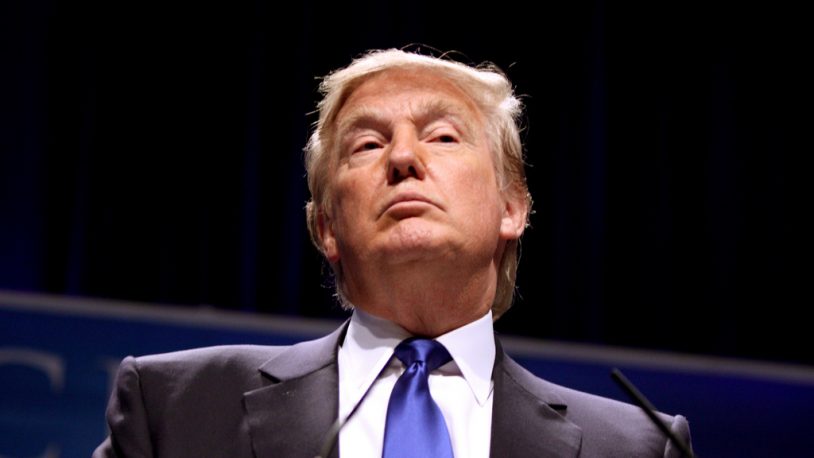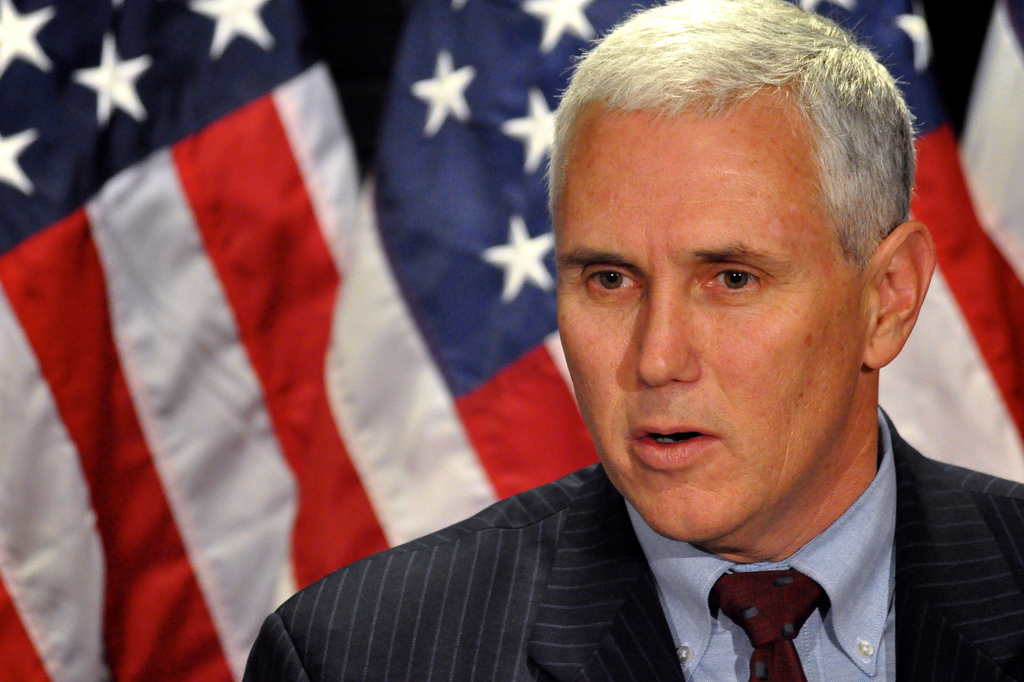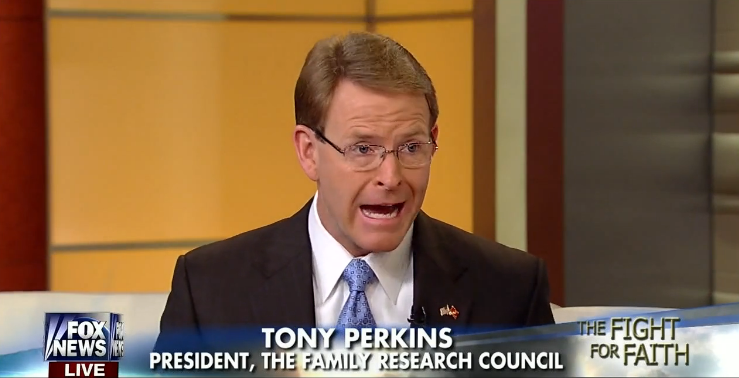It’s now been more than one year since the Supreme Court’s Obergefell ruling struck down state-level marriage equality bans, and the Religious Right’s many dire predictions about the ruling’s impact still haven’t come true.
But neither have predictions that Obergefell spelled the end of the anti-LGBT movement. Instead, this year, as the anti-LGBT Right’s brand of deceptive and bigoted politics became increasingly unpopular among Americans and continued to be defeated in the courts, many activists further concentrated their efforts on resisting LGBT equality abroad, while others pinned their hopes on November’s general election.
With the election of Donald Trump and a GOP-led Congress, the Religious Right hopes that it will have the chance to roll back LGBT rights after years of losing ground.
Here are some of the highlights and lowlights of the anti-gay Right’s 2016:
Trump-Pence Victory
Despite some misleading media coverage painting Trump as a gay rights ally, anti-LGBT activists scored a major victory with his election and are celebrating the fact that the president-elect has embraced their political agenda.
Trump, who actively courted even the most extreme figures of the Religious Right during his presidential campaign, vowed to appoint far-right justices who would follow in the footsteps of the staunchly anti-LGBT justice Antonin Scalia; criticized the Supreme Court’s marriage equality ruling; pledged to sign the First Amendment Defense Act, which is designed to enable anti-LGBT discrimination; defended Kentucky clerk Kim Davis’ attempt to refuse to issue marriage licenses to same-sex couples; and backed North Carolina Gov. Pat McCrory’s decision to sign the discriminatory HB2 bill into law.
After winning the election, Trump announced his intention to name LGBT rights opponents like Ben Carson, Betsy DeVos, Jeff Sessions, Tom Price and Steve Bannon to key posts in his administration.
The far-right Family Research Council, which has a significant presence in Trump’s transition team, hopes Trump continues to further the Religious Right’s goals by undoing “LGBT agenda” policies and removing “LGBTQ and abortion activists” from the State Department—and they have reason to be optimistic.
Trump’s decision to select Indiana Gov. Mike Pence as his running mate also reassured many social conservatives that a Trump administration would work to roll back LGBT equality.
Since the beginning of his political career, Pence has opposed anti-discrimination laws and efforts “to put gay and lesbian relationships on an equal legal status with heterosexual marriage.” He even proposed tapping into HIV prevention funding to fund “institutions which provide assistance to those seeking to change their sexual behavior,” language commonly used by conservatives to describe ex-gay conversion therapy, and lauded ads “showing that many former homosexual people had found happiness in a heterosexual lifestyle.” (As it happens, the Republican National Committee adopted a resolution during its convention this year criticizing efforts to put restrictions on the harmful practice of ex-gay therapy.)
Pence, a former board member of an anti-LGBT group, is also a critic of “AIDS activists,” legal protections for LGBT employees and hate crimes laws. He was a strong supporter of the military’s since-repealed ban on gay service members, alleging that “homosexuality is incompatible with military service.” A champion of the Federal Marriage Amendment, Pence said that a national ban on same-sex marriage was necessary to avoid “societal collapse.”
As governor of Indiana, Pence signed a so-called religious freedom law that would have allowed businesses to refuse services to LGBT customers; he only backed away from and revised the law following a national backlash.
Roy Moore’s Stand
Alabama Chief Justice Roy Moore once again became a martyr for the Religious Right cause this year when a state judicial body suspended him for the remainder of his term for flouting federal court rulings on marriage equality. In 2003, Moore was removed from office by the same court after he defied a federal judge’s order to remove a Ten Commandments monument that he had erected in his courthouse.
Moore’s latest suspension came after he insisted that Alabama probate judges should abide by the state’s ban on same-sex marriage, even though the Supreme Court had held such statutes to be unconstitutional, ordering probate judges “not to issue any marriage license contrary to the Alabama Sanctity of Marriage Amendment or the Alabama Marriage Protection Act.”
His stand emboldened “nullification” activists, who believe that states and localities can nullify federal laws and court rulings that they believe violate the Constitution and divine law, and Religious Right leaders who saw Moore as a victim of judicial tyranny. Mat Staver, who represented Moore and heads the far-right legal firm Liberty Counsel, even said that the decision to suspend Moore could lead the “dissolution of the entire republic.”
Moore, however, may find a new opportunity, as he is reportedly under consideration to fill the U.S. Senate seat of Jeff Sessions, Trump’s nominee for attorney general.
Orlando and its Aftermath
On June 12, Omar Mateen, an ISIS-inspired terrorist, killed 49 people and wounded 53 others at a Latin night at the gay nightclub Pulse in Orlando, Florida.
Several fringe Religious Right activists openly applauded the attack, while others, like Sam Rohrer, Rick Wiles and Kevin Swanson, maintained that the killings amounted to divine judgment.
Conservative columnist Timothy Buchanan urged “homosexuals, lesbians, bisexuals and transsexuals” to consider “returning to the closet” because “flaunting gross immorality and defiant wickedness that is hideous, odious and wretched to an overwhelming majority of people is a foolish and dangerous course of action.” Florida-based Religious Right leader John Stemberger said he was tired of Orlando residents flying “special interest rainbow flags” in honor of the attack’s victims, claiming that the flags undermined the cause of “unity.”
Conspiracy theory radio host Alex Jones said the LGBT community had “the blood of these 50-plus innocent men and women” on its hands because “the radical left is allied with Islam.” Tony Perkins, the president of the Family Research Council, said President Obama bore some blame for the killings because he’d “been promoting Islam.”
For the most part, conservatives tried to use the massacre to push the gun lobby’s agenda, demonize Muslims and crack down on immigration, despite the fact that Mateen was not an immigrant.
Trump cited the attack to justify his proposed ban on Muslims from entering the U.S. and said that the patrons at the nightclub, which had armed security, should have been armed. He later denied ever making the statement at all. Republican Rep. Steve King of Iowa also insisted that everyone at the nightclub should have “had a gun.”
After the killings, Sen. Ted Cruz of Texas, who had recently dropped out of the GOP presidential race, released a statement suggesting that Democrats refuse to condemn radical Islamists who kill gay people. This was ironic, given that Cruz himself had previously compared LGBT rights activists to terrorists and campaigned at an event alongside activist Kevin Swanson, who believes that gay people should receive the death penalty.
Two months to the day of the attack, Trump and Sen. Marco Rubio of Florida addressed an Orlando summit on “homosexual totalitarianism” organized by far-right anti-LGBT activists.
HB2
In response to an LGBT nondiscrimination ordinance approved by the Charlotte City Council, Republican state lawmakers in North Carolina passed a sweeping law, HB2, that eliminated legal protections for LGBT people, barred municipalities from enacting such measures, and prevented transgender people from using restrooms that correspond with the gender with which they identify.
Supporters portrayed the law as necessary to prevent transgender people or sexual predators posing as transgender people from preying upon girls in washrooms. Those smears led at least one supporter to harass a transgender woman as she used the bathroom.
Gov. Pat McCrory, a Republican, staked his re-election on his support for the law, and convinced Trump to reverse his previous criticism of HB2.
A large movement of LGBT and allied groups, including the interfaith Moral Monday movement, fought back, and McCrory lost his bid for re-election.
State Republicans, who successfully moved to strip the incoming Democratic governor of certain powers following McCrory’s defeat, then promised Charlotte’s local government that they would repeal HB2 if the city rescinded its ordinance. After the city did so, Republicans in the legislature kept HB2 anyway.
Louie Gohmert Bonus
Rep. Louie Gohmert, R-Texas, is no fan of gay rights, blaming gay people for Noah’s Flood and linking homosexuality to child abuse.
In one riveting speech on the House Floor in May, Gohmert said that equal rights for same-sex couples make no sense because if humans were to ever develop a space colony in order to save humanity in the event of a looming asteroid crash, it would be unwise to send gays into space.









